International Women’s Day serves as a platform to honor women globally while also highlighting the challenges they face, such as infertility. It’s essential to recognize that infertility does not discriminate based on gender. This discussion focuses on female infertility, its potential causes, and the steps one can take to address it.
What Leads to Female Infertility?
Female infertility can stem from various factors, with some of the primary causes including:
- Ovulation Disorders: Conditions where a woman does not ovulate regularly or at all. For instance, Polycystic Ovary Syndrome (PCOS) is a prevalent cause of infertility, often linked with symptoms such as excessive hair growth, acne, weight gain, and insulin resistance, all of which can hinder fertility. Another example is premature ovarian failure, which occurs when the ovaries stop functioning before age 40, leading to no egg production.
- Damaged Fallopian Tubes: Fallopian tubes can be damaged due to surgery or infections, which may prevent sperm from reaching the egg or block the fertilized egg from implanting in the uterus.
- Pelvic Inflammatory Disease (PID): This infection affects the upper female genital tract and can be caused by sexually transmitted infections (STIs). PID may lead to scarring and blockages in the fallopian tubes.
- Myomas: These benign tumors within or on the uterus can impact fertility, depending on their size and location, as they can obstruct the implantation of a fertilized egg.
- Endometriosis: A painful condition where tissue similar to the uterine lining grows outside the uterus, potentially damaging ovaries and fallopian tubes, thus complicating conception.
- Sterilization: Some women opt for sterilization, which blocks the fallopian tubes, making natural conception impossible.
- Medications and Chemotherapy: Certain medications, particularly those used in cancer treatment, can lead to ovarian failure.
- Age: Fertility tends to decline with age, so delaying motherhood can further decrease the chances of conceiving naturally.
When to Seek Fertility Evaluation?
It’s possible to assess fertility at any stage, and we provide thorough fertility assessment packages for those wishing to understand their reproductive health better. It’s advisable to seek immediate attention if:
- You’re aged between 35 and 40 and have been trying to conceive for over six months.
- You experience extremely painful periods.
- You’re over 40 years old.
- You have irregular or absent menstrual cycles.
- You’ve experienced multiple miscarriages.
- You’ve been diagnosed with endometriosis or PID.
- You have known fertility issues or have undergone cancer treatment.
How is Female Fertility Assessed?
If you’re concerned about your fertility, an initial consultation with a fertility specialist can help determine which tests may be necessary. Test results guide the next steps, which might involve lifestyle adjustments or more intricate treatments. Common fertility assessments include:
- Ultrasound Scan: This internal scan checks for abnormalities in the uterus and assesses the ovaries for the number of antral follicles (egg sacs).
- Anti-Müllerian Hormone (AMH) Test: Low AMH levels indicate a lower egg count, and this test is frequently used in fertility evaluations.
- HyCoSy Test: This test evaluates any possible blockages in the fallopian tubes by injecting dye through the cervix.
If you’re worried about your fertility, know that you’re not alone, and support and treatments are available. It’s also vital for your partner to be assessed if you’re in a relationship with a male partner. For more information on treatments that suit you, feel free to explore our resources or check out this blog post for additional insights.
In addition, considering at-home options? Make a Mom offers a comprehensive insemination kit that may fit your needs. For a deeper understanding of the process, Healthline provides excellent resources on pregnancy and home insemination.
In summary, International Women’s Day not only celebrates women but also sheds light on critical health issues like infertility. Understanding the causes and seeking timely assessments can empower women to take control of their reproductive health.

